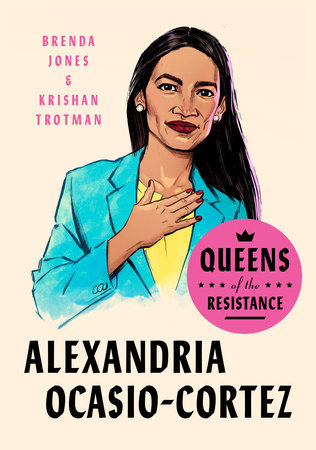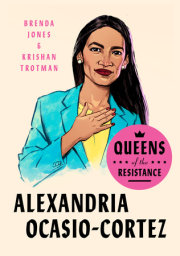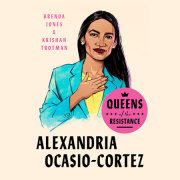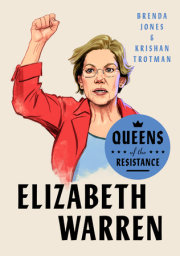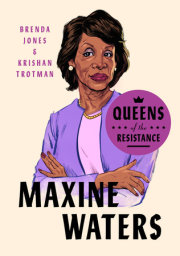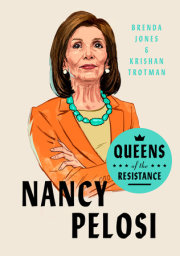Alexandria the Great!
Don't be fooled by the rocks that I got
I'm still, I'm still Jenny from the block.
-Jennifer Lopez, "Jenny from the Block"
Alexandria Ocasio-Cortez, nicknamed AOC, was born in the Bronx, pronounced "Da Bronx," also known as the Boogie-Down. It was the original settlement of a Dutch farmer named Jonas Bronck but it's since been crowned a name that has a bit more Latin flavor: the Bronx. Esta bien. It's the only borough in New York City so dope it has a definite article before its name. (Sorry, Brooklyn!) Other things amazing that come from the Bronx: Sonia Sotomayor, KRS-One, twenty-seven baseball World Series championships, A Bronx Tale, Billy Joel, leather hats, and Levi's jeans with three patches.
But let's keep it real about this incredible millennial and saucy representative of District 14 of Queens and the Boogie-Down, and begin this wandering into a new outlook on politics using her own words, because if you've scoped her Insta, you know, girl, AOC is infamous for keeping it 100 and she doesn't need some dotty author's introduction. This was the queen's campaign ad that led to her election, that led to our fist emojis and praises of "yaasss, finally" every time she went viral taking down crooked politicians on TV, or when she appeared walking through a congressional hall in a white cape and big gold hoop earrings:
Women like me aren't supposed to run for office.
I wasn't born to a wealthy or powerful family. Mother from Puerto Rico. Dad from the Bronx. I was born in a place where your zip code determines your destiny.
My name is Alexandria Ocasio-Cortez. I'm an educator, an organizer, a working-class New Yorker. I've worked with expectant mothers, I've waited tables and led classrooms, and going into politics wasn't in the plan. But after twenty years of the same representation we have to ask: who has New York been changing for?
Every day gets harder for working families like mine to get by.
The rent gets higher, healthcare covers less, and our income stays the same. It's clear that these changes haven't been for us, and we deserve a champion.
It's time to fight for a New York that working families can afford. That's why I'm running for Congress. This race is about people versus money.
We've got people, they've got money. It's time we acknowledged that not all Democrats are the same.
That a Democrat who takes money, profits off foreclosure, doesn't live here, doesn't send his kids to our schools, doesn't drink our water, doesn't breathe our air cannot possibly represent us. What the Bronx and Queens needs is Medicare for All, tuition-free public college, a federal jobs guarantee, and criminal-justice reform.
We can do it now.
It doesn't take a hundred years to do this. It takes political courage.
How Alexandria Ocasio-Cortez went from bartender one day to one of the youngest members of Congress ever elected in all of American history the next is a story of our times in politics. It is the place where politics and activism must merge. It is the catalyst to a series like the Queens of the Resistance. Sis, it's time to put down the latte and get your swirl on in politics no matter what your age. Women like AOC are pulling back the curtain on patriarchy and introducing a new swag in government. She's been a guest judge on RuPaul's Drag Race, for chrissakes! That's hitting intersectionality, culture, and politics all in one night of fabulousness. And she rented the dress, honey. AOC is not one of these rich politicians rapping about the poor but has never seen a broke day in her life. She has student debt and rent-making issues like the rest of the millennials.
Politics is planning, it's strategy, it's science, it's aching feet and nonstop eighteen-hour days, but when there are mice biting at the edges of democracy, new leadership must show its face. When the country has a unified fever for change, someone like AOC appears on the scene and we pay attention-it may look like magic where we wonder, mouth agape, how in the heck did she go from the Flats Fix restaurant to The View? But that's the flava of a good American story, and there's a lot more to it than "pretty bartender enters ringside." It took hard work, a fierce team, and tons and tons of resistance.
Her drive to run for Congress stemmed from the absurdity of recent times that got many of us to pay attention to politics. And it's a great thing when young people get fired up to change the world.
Martin Luther King Jr., Rep. John Lewis, and even Jesus were in their youth when they wrapped their arms around a fed-up society and had the strength to pick it up. There can be a generational divide on some things, but not matters of the heart. And let's face it, AOC's a millennial who likes to dance and does facials on Insta, baby. She's not married with children; she's still adulting, up late having wine and popcorn for dinner while waiting for her boyfriend. Girl, she like Olivia Pope but without all the relationship drama and lifelong soapbox in DC.
The beauty of AOC is not that she's any different from us, it's that finally we see faces in government that look like us. AOC's come-up was with a squad, a tribe-representatives like Ayanna Pressley, Ilhan Omar, Rashida Tlaib, and more. She and other Queens of the Resistance have had the courage to take on the huge challenge of giving a facelift to politics as we know it to get themselves elected. And now AOC continues to fight that same battle day after day in the House of Representatives. And she'll do it in a pair of Timberland boots or six-inch heels; either way, she does it with her own style. She's never anyone else but Alexandria Ocasio-Cortez. Her rise started with a response to an idea, which became a plan and birthed a strategy. She doesn't lead using a template, because that's not what has gotten her this far, sis.
But before we get to her trailblazing rise, we first have to understand where she came from. . . .
THE TENETS OF SERGIO
You are the sunshine of my life,
That's why I'll always be around.
-Stevie Wonder, "You Are the Sunshine of My Life"
As you probably know by now, when our Boricua, Alexandria Ocasio-Cortez, was born, her family resided in the Parkchester area of the Bronx. (Boricua means "Brave and Noble Lord." Boriken or Boriqu’n are the indigenous names from which Boricua ascended on the island of Puerto Rico. Many, many years ago before the Spanish came along with their trickery and conquered, the Boricuas ruled. *wink* Queenhood is in our Boricua's blood.)
There are many fantastical tales of wonder and enchantment that originated in the Bronx during the 1980s and '90s: How the Garc’a Girls Lost Their Accents, Gloria Estefan, and that of Alexandria Ocasio-Cortez, but it is Sergio Ocasio-Roman, Alexandria the Great's father, who begins this story in Parkchester.
Parkchester at one time was a large school that housed orphaned and troubled boys. In 1938, during the height of the Great Depression, the Metropolitan Life Insurance Company, then one of the biggest corporations in America, decided to diversify by investing in real estate. They built Parkchester, one of the first self-contained communities for working-class families who needed to purchase affordable property. Met Life, like many manufacturing companies at the time, built company towns. In order to make working for these companies attractive and accessible, corporations built whole towns that had housing and all the amenities people would need. It was whites-only at the time and also became a haven for WWII vets seeking a way and means for their families in return for their service to the nation. Despite change and the passage of time, it was still considered one of the most successful housing developments in New York.
This area would eventually become the neighborhood where Sergio was born on November 24, 1959, to parents Sergio Ocasio and Thamar Neirida Ocasio, who hailed from the Caribbean-blue sea of Puerto Rico.
From the time that Sergio was eleven years old to when he was twenty-one, the Bronx lost 97 percent of its buildings to fire. Bronx residents were blamed for the debacle, but actually, because property values had begun to fall, landlords found they could not sell their buildings for a profit, so they began to set their buildings on fire to collect the insurance, often in the millions of dollars. It was one of the defining periods of Sergio's life.
"I was born to a dad who was born in the South Bronx while the Bronx was burning, while landlords were committing arson to their own buildings," AOC recalled in an interview with Vogue magazine. "He grew up as a kid with five people in a one-bedroom apartment."
Over time, due to urban wizardry, Parkchester transformed from a moderate-income community, built to give opportunity to those seeking to own property, to a place that welcomed a more diverse community, too. And with that, a great "white flight" ensued. There began an exodus of more affluent white owners, and as economic stability declined in the South Bronx, violence and tension rose to its peak, leaving the remaining brown residents with crooked landlords and less safety.
Yet the flowers still bloomed in Parkchester. Growing up in the Bronx in the 1960s as a Puerto Rican man with an outgrown mane and healthy mustache, Sergio was an ambitious, politically conscious young man who could both run a business during the week and roast a pig in a pit on the weekends. He loved to fish. Best of all, he used his intelligence and know-how to pull his family forward at every opportunity.
Over the course of Sergio's youth, the Puerto Rican population of New York grew to hundreds of thousands of people. Nearly 80 percent of the Hispanic community in New York was Puerto Rican between 1970 and the early 1990s.
It's notable that Sergio Ocasio decided to become an architect, and there must have been something about the redbrick village of Parkchester that made him want to contribute. He set up his company right there in Parkchester. Kirschenbaum Ocasio-Roman Architects PC was operated out of a six-hundred-foot ground-level apartment on Archer Road. He shared the space with his business partner and six employees. Not only did they specialize in building and inspection services, they offered landscaping, lawn maintenance, engineering services, and more for Parkchester's South and North divisions. Managers and developers of low-income housing in the Bronx and Westchester County, such as Promesa, a social services company, would also commission Sergio's firm.
The media has attacked and criticized Queen AOC for stating that she and her family were poor. Oh, please! A consulting service of $65 per hour can afford you a business and a home but doesn't scream "rich"! There are many working people with homes and businesses in this nation who are only a paycheck away from "poor." Alexandria once said, "If we can acknowledge how many Americans are actually in poverty, I think that we can start to address some of the more systemic issues in our economy."
It was on a business trip to Puerto Rico where Sergio met the beautiful and marvelous Blanca Cortez, la madre de Alexandria. According to AOC, Blanca and her family lived in poverty in Puerto Rico, and she spent much of her life raising her siblings while her own mother worked. The two were a handsome pair-Sergio's height and dark features met Blanca's petite and fair ones, and they were married in a church in Puerto Rico and then moved to the Bronx.
In 1986, Sergio bought their 725-square-foot home on Unionport Road in Parkchester, and they started a family. Their first child, Alexandria Ocasio-Cortez, came along on October 13, 1989. A few years later, a son was born, Gabriel. He calls himself, "the proudest brother in the world."
Sergio was a visionary. He saw that safe and secure housing was an issue that defined the lives of the community of the South Bronx, so he'd started his architectural firm. Blanca was committed to a better life for her young family, and she helped with the household by balancing secretarial and cleaning work. Sergio and Blanca weren't rich; they were survivors.
When Alexandria was five years old, the family made the big decision to move out of Parkchester, where generations of their family still remained, to Yorktown Heights, a suburb in Westchester County, in order to put the children in a better school system. They could only afford a small house in this prosperous community. It was a little white house, just two bedrooms; one would be for Sergio and his Blanca and the other for Alexandria and Gabriel. The new home was surrounded by trees and a lawn where flowers could be planted, and a driveway where Sergio could pull in after a long day's work. It was quiet, it was safe. It was the American dream.
Sergio's parents had pushed for his education, and now he'd do the same for their children. As AOC mentioned, she was raised in a time when your zip code determined your education, and it still does. In this case, it became a power move for Sergio to get his children out of Parkchester. Blanca was right: their kids deserved the best. He'd count pennies and make calls to his family to ask for a helping hand, if that's what it took. In typical New York "rent party" style, Sergio's aunts, uncles, and extended family chipped in to help. Getting the house was just one big push, but staying there would be a constant struggle. He summoned his Boricua bravery and challenged fate, determined to make a space where his children could thrive. Better schools and a good education was what he was betting on, along with an environment that was frankly less political and more . . . well, peaceful. Parkchester would forever be their home, it was their beginning, but it didn't need to be the only place they knew.
Think about it: the first wave of Puerto Ricans settled in the United States in 1917, with successive waves to follow in the 1930s and beyond. It was a hustle, and the sacrifice was time, exhaustion, sweat, and bone-breaking labor in exchange for the grander future it would funnel to their families. It wasn't about staying in the present, it was about the future. The language barrier made it impossible for many workers to compete for the better jobs. And the darker a person's skin was, the harder it was to succeed. Doors of opportunity were tightly closed, and a true path ahead was shielded and made difficult.
Copyright © 2020 by Brenda Jones. All rights reserved. No part of this excerpt may be reproduced or reprinted without permission in writing from the publisher.

